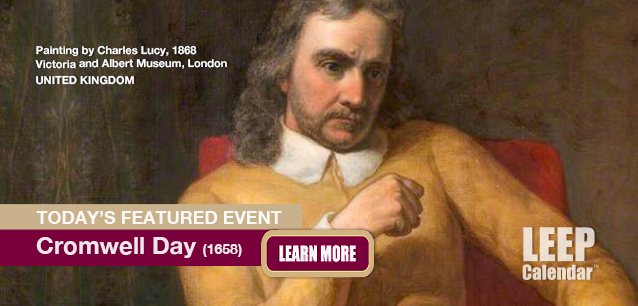 AD
AD
Today is: January 02
Scroll to explore events active on this date.
Additional Events on LEEP
LEEP INK FEATURES

August? Absolutely!
In August, we live through the Dog Days of Summer. It's hot and often humid, and those who can leave for better climates do. Down south, winter is in full force. August is also known as "the ...

In The Heat of July: July 2025 Events
Is it hot enough (or cold enough if you're below the equator) for you yet? There is actually a day for that! Like every month, I pick a diverse collection of events you may or may not know about. This ...

May Blooms: Events in May 2025
Along with October, May is one of the most densely packed months of the year. It's before the summer humidity and the last whole month of the school year. The weather is warming in t...
About National Cromwell Day in the United Kingdom
Legal , United Kingdom & Ireland
Ends: Sep 03, 2025
DESCRIPTION:
September 3, 1658, is the anniversary of the death of Oliver Cromwell, one of the most controversial and infamous politicians in British history. He is one of two famous Cromwells. The first, Sir Thomas Cromwell, his great uncle, served under King Henry VIII until his execution in 1540.
Oliver Cromwell was a military and political leader and Lord Protector of the Commonwealth of England, Scotland, Wales, and Ireland.
By the 1630s, Cromwell became the equivalent of a "Born Again Christian." In his day, the reference was "Congregation of the firstborn," a derivative of Puritanism. His starkly conservative religiosity informed his decisions from this point forward, believing that the whole of England had fallen into sin and the Crown should eradicate the Catholic faith from the country.
On December 16, 1653, Cromwell was sworn in as Lord Protector of Britain, four years after the January 30, 1649, execution of King Charles I (which Cromwell authorized). Under his rule, with the assistance of parliament, Cromwell sought to reunite the nation, currently at odds due to civil war and uncertainty, and enforce a moral doctrine upon the people. Many believed he usurped monarchical power, and this brutal imposition of Puritanism would stain his record posthumously. He died of disease on September 3, 1658, at the age of 59.
But his story doesn't end with his death. King Charles II, restored to the throne in 1659, so hated Cromwell for killing his father that his remains were dug up on January 30, 1661, and he was posthumously executed. It sounds like an oxymoron, but the King killed a dead man. Then his remains were hung in public, with his head stuck on a pike.
Years later, his reputation would be restored. Some, such as the writer John Milton, saw him as a "Hero of Liberty." Others, including Winston Churchill, viewed him as a regicidal dictator and genocidal. Due to their strong affinity to Catholicism, the Irish and Scottish have issues with him to this day. In 2002, the British parliament voted Oliver Cromwell one of the Ten Greatest Britons of All Time. Acceptance of this label depends upon where one sits on the religious scale.
Whatever your opinion of Oliver Cromwell, there is one thing all can agree on: his life left a profound legacy and helped the United Kingdom become what it is today.
VIDEOS
Currently, this event does not have supporting videos.
SUPPORTING DOCUMENTS
Currently, this event does not have supporting documents.
ADDITIONAL IMAGES
Currently, this event does not have supporting images.
Where would you like to go now?
 AD
AD


/footer-logo.svg)
